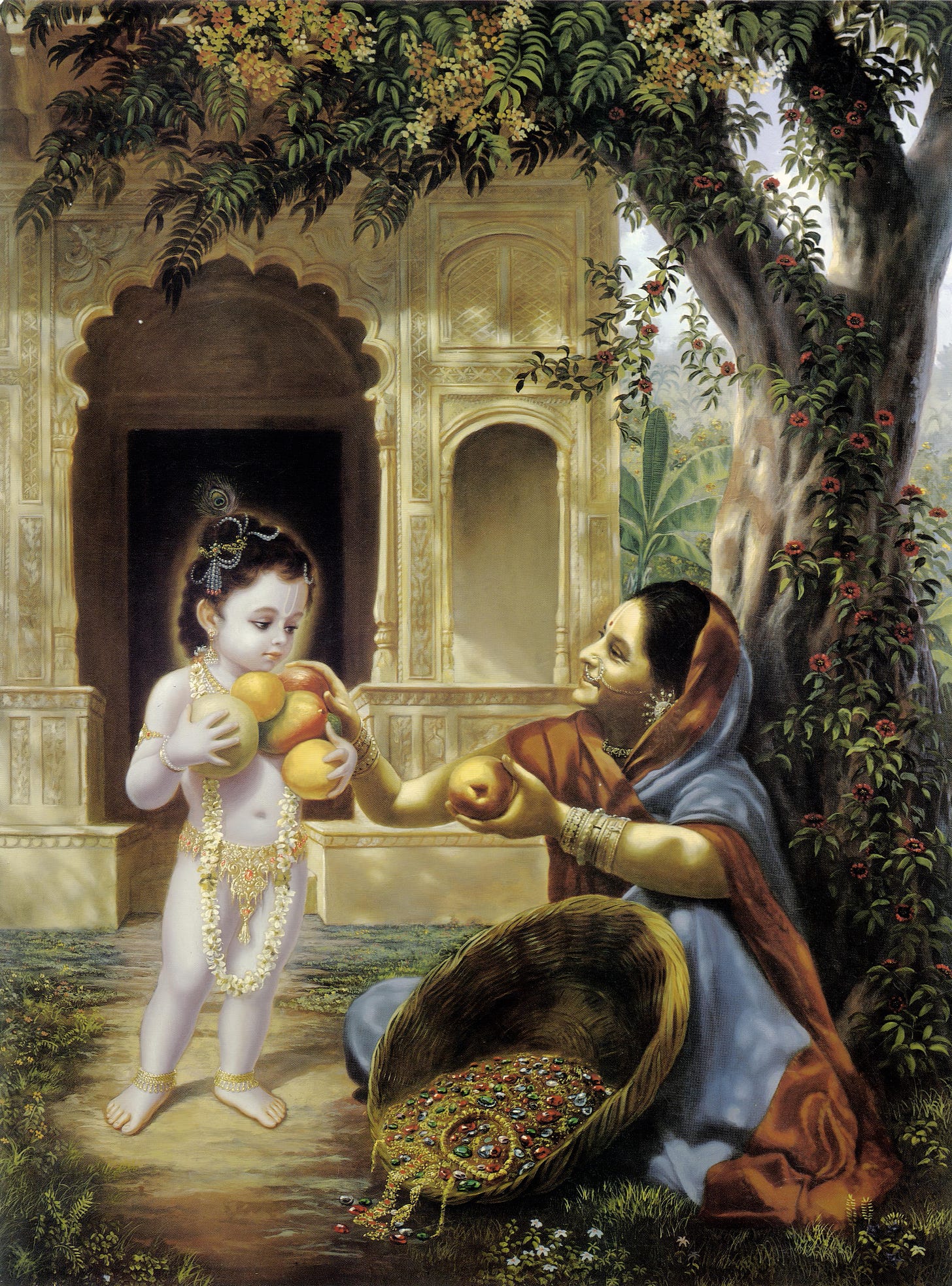The vijñāna-maya (Taittiriya Upanisad 2.4)
The next stage is the vijñāna-maya, the stage where spiritual consciousness finally becomes prominent and one starts seeing himself as a soul. Gradually regain our original consciousness.
Section 4: The vijñāna-maya
The next stage is the vijñāna-maya, the stage where spiritual consciousness finally becomes prominent and one starts seeing himself as a soul. This vijñāna-maya stage of consciousness is described as having a human form, composed of faith, proper conduct, eternity, and connection with the Lord. These are characteristics of the soul, and one who reaches the stage of vijñāna-maya develops these qualities. Once we attain the stage of vijñāna-maya, we gain the power to continue evolving our spiritual realization and gradually regain, by the mercy of the Lord, our original transcendental nature.
Text 2.4.1
yato vāco nivartante, aprāpya manasā saha
ānandam brahmaṇo vidvān, na bibheti kadācaneti
tasyaiṣa eva śārīra ātmā, yaḥ pūrvasyatasmād vā etasmānmanomayāt, anyo’ntara ātmā vijñānamayaḥ
tenaiṣa pūrṇaḥ, sa vā eṣa puruṣavidha eva
tasya puruṣavidhatām, anvayam puruṣavidhaḥ
tasya śraddhaiva śiraḥ, ṛtam dakṣiṇaḥ pakṣaḥ
satyam uttaraḥ pakṣaḥ yoga ātmā, mahaḥ puccham pratiṣṭhā
tad apy eṣa śloko bhavati
He who knows the bliss of the Supreme Brahman, whom neither the mind nor speech are capable of reaching, attains fearlessness. The inner Self of the mano-maya person, which consists of the subtle body, is the same as that of the prāṇa-maya.
This inner Self consists of transcendental understanding (vijñāna). The mano-maya is filled with this vijñāna-maya. He also has the shape of a man, like the human shape of the mano-maya. Faith (śraddhā) is his head; proper conduct (ṛtam) is his right arm; truth (satyam) is his left arm; absorption in yogic trance is his Self and Mahaḥ is his foundation.
Commentary: It's not possible to fully understand the glories of the Lord. In Srimad Bhagavatam (2.6.34-35), Lord Brahma himself admits: "Although I am known as the great Brahmā, perfect in the disciplic succession of Vedic wisdom, and although I have undergone all austerities and am an expert in mystic powers and self-realization, and although I am recognized as such by the great forefathers of the living entities, who offer me respectful obeisances, still I cannot understand Him, the Lord, the very source of my birth."
Although Brahma is so powerful, he is unable to fully comprehend the glories of the Lord. Because of his devotion, Brahma can understand to a certain extent, but it's not possible for anyone to fully understand the opulence of the Lord, since He is unlimited. Just like one can't estimate an unlimited number, one can't understand the unlimited opulences of the Lord. The same applies to us. To the extent of our devotion, we may be able to understand the Lord up to a certain extent, and from there we may gradually understand more, but it is not possible for anyone to fully understand Him. Even the Lord's personal associates, who live with Him in the spiritual realm, are constantly amazed by learning new details about the Lord's qualities and activities.
Can Krsna estimate the extension of His opulence? As Prabhupada mentions in his purport to SB 2.3.26, surely He can, but because His potencies are always expanding, immediately there is something new that was not included in His estimation. If Krsna tries to estimate a second time, including the new expansions, immediately something new appears, and so on. Therefore, even Krsna Himself becomes surprised. In this way, it's not possible to understand Krsna by experimentation or speculation. The process is thus to abandon the attitude of imagining Krsna as an object we can study and simply surrender to Him. As Lord Brahma concludes (SB 2.36.36), this surrender is all auspicious and allows us to attain unlimited spiritual happiness. "Therefore it is best for me to surrender unto His feet, which alone can deliver one from the miseries of repeated birth and death. Such surrender is all-auspicious and allows one to perceive all happiness. Even the sky cannot estimate the limits of its own expansion. So what can others do when the Lord Himself is unable to estimate His own limits?"
By surrendering to the Lord, one can easily attain a platform of spiritual bliss, and on such a platform one finally attains fearlessness, realizing one's transcendental nature.
The ātmā of the mano-maya person is the same as that of the prāṇa-maya, which is the vijñāna-maya, or the soul. Our self has many layers, including the gross body, the vital air, the mind, material intelligence, and the false ego, but all of this is sustained by the soul. However, not everyone sees himself as the soul, therefore this is a level of understanding that we need to reach at some point in our lives. It’s generally not something we are born with.
The next stage is the vijñāna-maya, the stage where spiritual consciousness finally becomes prominent and one starts seeing himself as a soul. This vijñāna-maya stage of consciousness is described as having a human form (just like Krsna has a form, the soul also has an original form, none of them are formless). This form is composed of śraddhā (faith), ṛtam (proper conduct), satyam (eternity, or truth), and yoga (connection with the Lord). These are characteristics of the soul, and one who reaches the stage of vijñāna-maya develops these qualities.
There is another characteristic that is mentioned: Mahaḥ. What is it? Mahaḥ refers to the power to destroy obstacles and reach the Lord. Once we attain the stage of vijñāna-maya, we gain the power to continue evolving our spiritual realization and gradually regain, by the mercy of the Lord, our original transcendental nature.




हरि अनंत हरि कथा अनंता।
हरि बोल।।।